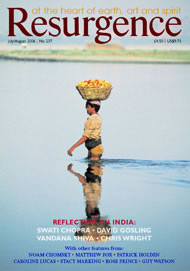THE THESIS BEHIND Lester Brown’s new book is simple. Plan A, business-as-usual, has the world on an economic path that is leading towards economic decline and eventual collapse. If our goal is to sustain economic progress, we have no choice other than move onto a new path – Plan B.
Brown originally published a book of the same name in 2003. The fact that he has produced a new updated and expanded version, Plan B 2.0, just three years later is testament both to how fast the world is advancing towards the decline he predicted, and to his rising impatience over continued inaction.
“There is still no widely shared sense that we need to build a new economy – and even less, a vision of what it might look like,” he complains. His new book is offered as a tool to help make a more convincing case for building that new economy, to set out a more detailed vision of what it would look like, and to provide a road map of how to get from here to there.
If it were knowledge alone that we lacked, then this book would spur a new environmental revolution tomorrow. Crammed full of the latest terrible facts and figures, the first half is an excruciating read. Shrinking forests, falling water-tables, collapsing fisheries, rising temperatures, melting glaciers, accelerating climate change – Brown compiles an unsparing catalogue of the enormous damage a fossil-fuel-based, ever-expanding economy and population have wrought on a once bounteous planet.
Plan B itself, which makes up the second half of the book, has three essential components: a restructuring of the global economy so that it can sustain civilisation; a comprehensive strategy to eradicate poverty and stabilise population; and finally a systematic effort to restore natural systems.
While there may be quarrels over some aspects of his analysis (he is over-optimistic that coal use will decline, for example, under-estimates the pollution associated with aquaculture, and is perhaps over-reliant on market-based mechanisms to achieve change), Brown’s overall action plan is both comprehensive and compelling.
Glimpses of the new economy can be seen in the wind farms of Western Europe, the solar rooftops of Japan, the reforested mountains of South Korea, and the bicycle-friendly streets of Amsterdam. “Virtually everything we need to do to build an economy that will sustain economic progress is already being done in one or more countries,” says Brown.
Not only that, but Plan B is also affordable. Combining social goals and Earth-restoration components into a Plan B budget yields an additional annual expenditure of US$161 billion – the equivalent of just one sixth of the global military budget.
Which gives rise to the question, why are politicians still failing to act? If the provision of the relevant information alone were sufficient to prompt the adoption of the measures in Plan B, we would surely have acted long ago. As Brown admits, if someone somewhere one day erects a tombstone for our civilisation, it cannot say we did not understand. We do understand. It cannot say we did not have the resources. We do have the resources. It can only say that time ran out. As Brown soberly observes, “in this mobilisation, the scarcest resource of all is time.”
If there is one weakness in the book, it is precisely that the road map of how to get from here to there is only briefly signposted.
“This chapter is frustratingly difficult to write because it is not about what we need to do or how to do it, but rather about how to mobilise support to do it,” Brown says of his final chapter, ‘Building a New Future’. “How do we convince ourselves of the gravity and urgency of the situation we face?”
That, indeed, is the question – and one that is still not fully answered in this new version of Plan B. There is no strategy for challenging the vested interests in the current economic system, and little about how to build the political movement that will be essential for change.
But it is clear that for Brown, rising public concern holds the key. He has formed a Plan B ‘team’ of concerned individuals, who are distributing the book to as many decision-makers as possible. He has made the book available for free download from the Earth Policy Institute website. And in his final pages, Brown challenges each of us to plan how we will play our own role, since – as he concludes – “saving our civilisation is not a spectator sport.”
Caroline Lucas is Green Party MEP for South East England, and a Principal Speaker for the Green Party.






